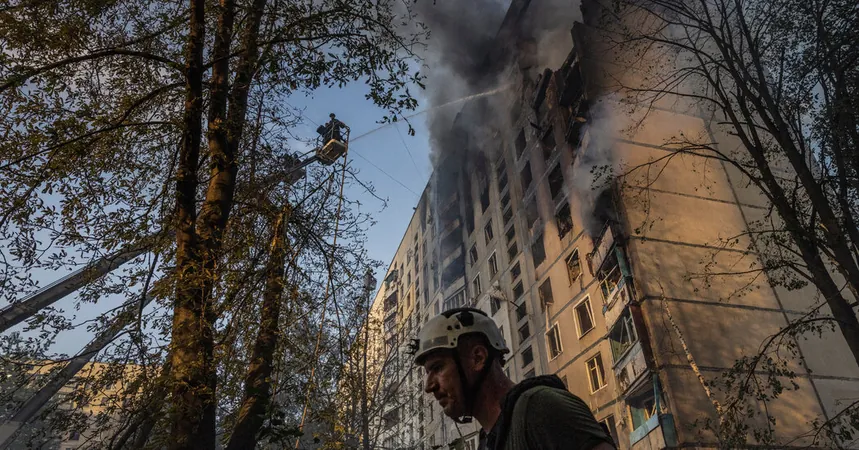
U.S. Intelligence Warns of Potential Backlash Over Ukraine's Long-Range Strike Capabilities
2024-09-26
Author: Lok
U.S. intelligence agencies have raised urgent alarms regarding the implications of allowing Ukraine to launch long-range strikes using missiles supplied by the U.S., UK, and France against targets deep within Russia. According to unnamed U.S. officials, there is a credible fear that if permission is granted, Russia may retaliate with even greater force, potentially resulting in lethal attacks on both American and allied forces.
This newly disclosed intelligence assessment suggests that even though Ukraine has a few long-range missiles at its disposal, their current numbers are limited, and it's uncertain how many more Western allies might be willing to supply. This raises a crucial question for President Biden, especially following a recent meeting with Ukrainian President Volodymyr Zelensky at the White House, where the difficult decision regarding missile usage was at the forefront of discussions.
Zelensky has consistently advocated for the authority to carry out strikes on Russian soil, seeking to shift the battlefront deeper into enemy territory. Meanwhile, Russian President Vladimir Putin has ramped up his hostile rhetoric, employing threats as a strategy to deter Western nations from enhancing Ukraine's military capabilities further.
Critics of the Biden administration argue that officials have succumbed too easily to Putin's intimidation, hampering Ukraine's combat effectiveness on the battlefield. However, supporters of the cautious approach assert it has successfully minimized the risk of provoking an escalated Russian response—though the situation may be changing.
Conversely, British leaders have shown a willingness to support Ukraine's use of supplied long-range missiles for deep strikes against Russia. They are, however, awaiting Biden's decision before proceeding, as the potential repercussions on security for their coalition partners loom large.
The intelligence assessment outlines various potential Russian retaliation measures if long-range strikes are permitted, ranging from sabotage acts targeting facilities in Europe to aggressive assaults on U.S. and European military installations. U.S. officials allege that Russia's G.R.U. intelligence agency has orchestrated most sabotage activities across Europe thus far. Should hostilities escalate, analysts predict Russia might shift its response to covert operations, avoiding overt actions that could risk provoking a wider conflict.
Putin's rhetoric has escalated dangerously in recent days, leading several of Biden’s advisers to suspect that a decision favoring Zelensky could incite a violent Russian response.
Despite the risks, there are elements within the Biden administration advocating for Ukraine to utilize long-range missiles, which include the American-made ATACMS, British Storm Shadow, and French SCALP missiles. These missiles have already been deployed in limited strikes against Russian targets around the annexed Crimean Peninsula.
Proponents argue that allowing Ukraine to target sites over 190 miles into Russia would significantly disrupt Russian supply lines, impacting its military capabilities on the front lines and providing vital support for Ukraine as it navigates a precarious battlefield situation. However, intelligence assessments cast doubt on the notion that even with enhanced missile access, Ukraine would secure enough firepower to fundamentally change the conflict. Russian forces are likely to adapt swiftly by relocating critical military assets out of the missiles' range.
The U.S. military could potentially increase the supply of ATACMS to Ukraine under Biden's directive. However, officials highlight that the U.S. maintains a limited stock of these missiles, with necessity to retain reserves for its own military contingencies.
As decisions loom, the precarious nature of the conflict escalates, intensifying the urgency around U.S. policies and military aid in support of Ukraine. The world watches closely as the fate of this embattled nation hangs in the balance.




 Brasil (PT)
Brasil (PT)
 Canada (EN)
Canada (EN)
 Chile (ES)
Chile (ES)
 España (ES)
España (ES)
 France (FR)
France (FR)
 Hong Kong (EN)
Hong Kong (EN)
 Italia (IT)
Italia (IT)
 日本 (JA)
日本 (JA)
 Magyarország (HU)
Magyarország (HU)
 Norge (NO)
Norge (NO)
 Polska (PL)
Polska (PL)
 Schweiz (DE)
Schweiz (DE)
 Singapore (EN)
Singapore (EN)
 Sverige (SV)
Sverige (SV)
 Suomi (FI)
Suomi (FI)
 Türkiye (TR)
Türkiye (TR)